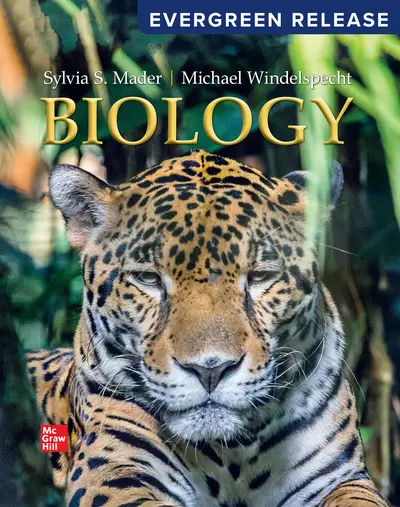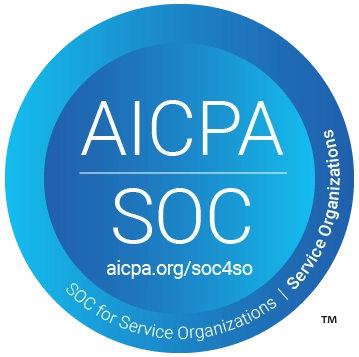My Account Details


Biology: 2024 Release
Format Options:
McGraw Hill eBook
Textbook Rental (150 Days Access)
- Rent for a fraction of the printed textbook price
- Complete text bound in hardcover or softcover
Loose-Leaf Purchase
Unbound loose-leaf version of full text
Shipping Options
- Standard
- Next-day air
- 2nd-day air
Orders within the United States are shipped via FedEx or UPS Ground. For shipments to locations outside of the U.S., only standard shipping is available. All shipping options assume the product is available and that processing an order takes 24 to 48 hours prior to shipping.
Note: Connect can only be used if assigned by your instructor.
Connect (540 Days Access)
- Digital access to a comprehensive online learning platform
- Includes homework, study tools, eBook, and adaptive assignments
- Download the free ReadAnywhere app to access the eBook offline
Connect + Loose-Leaf
- Comprehensive online learning platform + unbound loose-leaf print text package
- Connect includes homework, study tools, eBook, and adaptive assignments
- Download the free ReadAnywhere app to access the eBook offline
Shipping Options
- Standard
- Next-day air
- 2nd-day air
Orders within the United States are shipped via FedEx or UPS Ground. For shipments to locations outside of the U.S., only standard shipping is available. All shipping options assume the product is available and that processing an order takes 24 to 48 hours prior to shipping.
McGraw Hill GO (540 Days Access)
- Digital access to eBook+ embedded in your school's Learning Management System (LMS)
- Includes full eBook and chapter questions
- Download the free ReadAnywhere app for offline and mobile access
* The estimated amount of time this product will be on the market is based on a number of factors, including faculty input to instructional design and the prior revision cycle and updates to academic research-which typically results in a revision cycle ranging from every two to four years for this product. Pricing subject to change at any time.
Instructor Information
Quick Actions (Only for Validated Instructor Accounts):
Biology is a traditional, comprehensive introductory biology textbook with coverage from cell structure and function to the conservation of biodiversity and is appropriate for a one- or two-semester biology course. Biology focuses on three themes: systems, evolution, and the nature of science. These themes are integrated into all aspects of the textbook, from the unit learning outcomes to the theme-based feature readings in the text. Recognizing that instructors are increasingly being asked to engage their students while still providing them with a firm foundation in core biological principles, the authors of Biology integrated relevant content throughout the text to better allow students to make connections and think more scientifically.
Unit 1 The Cell
2 Basic Chemistry
3 The Chemistry of Organic Molecules
4 Cell Structure and Function
5 Membrane Structure and Function
6 Metabolism: Energy and Enzymes
7 Photosynthesis
8 Cellular Respiration
Unit 2 Genetic Basis of Life
9 The Cell Cycle and Cellular Reproduction
10 Meiosis and Sexual Reproduction
11 Mendelian Patterns of Inheritance
12 Molecular Biology of the Gene
13 Regulation of Gene Expression
14 Biotechnology and Genomics
Unit 3 Evolution
15 Darwin and Evolution
16 How Populations Evolve
17 Speciation and Macroevolution
18 The Origin and History of Life
19 Taxonomy, Systematics, and Phylogeny
Unit 4 Microbial Evolution
20 Viruses, Bacteria, and Archaea
21 Protist Evolution and Diversity
22 Fungi Evolution and Diversity
Unit 5 Plant Evolution and Biology
23 Plant Evolution and Diversity
24 Flowering Plants: Structure and Organization
25 Flowering Plants: Nutrition and Transport
26 Flowering Plants: Control of Growth Responses
27 Flowering Plants: Reproduction
Unit 6 Animal Evolution and Diversity
28 Invertebrate Evolution
29 Vertebrate Evolution
30 Human Evolution
Unit 7 Comparative Animal Biology
31 Animal Organization and Homeostasis
32 Circulation and Cardiovascular Systems
33 The Lymphatic and Immune Systems
34 Digestive Systems and Nutrition
35 Respiratory Systems
36 Body Fluid Regulation and Excretory Systems
37 Neurons and Nervous Systems
38 Sense Organs
39 Locomotion and Support Systems
40 Hormones and Endocrine Systems
41 Reproductive Systems
42 Animal Development and aging
43 Animal Behavior
Unit 8 Ecology
44 Population Ecology
45 Community and Ecosystem Ecology
46 Major Ecosystems of the Biosphere
47 Conservation of Biodiversity
Main Features
- LMS Integration
- Print/Loose-Leaf Book Add-On Availability
- Presentation Slides & Instructor Resources
- Question & Test Banks
- Adaptive Assignments
- Student Progress Reporting & Analytics
- Essay Prompts
- Polling
- Prebuilt Courses
- Interactive Exercises
- eBook Access (ReadAnywhere App)
- Remote Proctoring (Proctorio)
- Subject-Specific Tools
Main Features
- Quick Setup
- Lives within the LMS
- Assignable Readings
- Auto-Graded Chapter Questions
About the Author
Sylvia Mader
Sylvia S. Mader has authored several nationally recognized biology texts published by McGraw-Hill. Educated at Bryn Mawr College, Harvard University, Tufts University, and Nova Southeastern University, she holds degrees in both Biology and Education. Over the years she has taught at University of Massachusetts, Lowell; Massachusetts Bay Community College; Suffolk University; and Nathan Mayhew Seminars. Her ability to reach out to science-shy students led to the writing of her first text, Inquiry into Life, which is now in its fifteenth edition. Highly acclaimed for her crisp and entertaining writing style, her books have become models for others who write in the field of biology.
Michael Windelspecht
Michael Windelspecht has taught introductory biology, genetics, and human genetics in the online, traditional, and hybrid formats at community colleges, universities, and military institutions. Educated at Michigan State University and the University of South Florida, he is currently an adjunct professor of biology at Appalachian State University. He served for over a decade as the Introductory Biology Coordinator at Appalachian State University, a program that enrolled over 4,500 students annually. As an author and editor, Dr. Windelspecht has published over 20 reference textbooks and multiple print and online lab manuals and has founded several science communication companies, including Ricochet Creative Productions, which develops and assesses new technologies for the science classroom. Learn more about Dr. Windelspecht at www.michaelwindelspecht.com.
Accessibility
Creating accessible products is a priority for McGraw Hill. We make accessibility and adhering to WCAG AA guidelines a part of our day-to-day development efforts and product roadmaps.
For more information, visit our accessibility page, or contact us at accessibility@mheducation.com
Affordability
Reduce course material costs for your students while still providing full access to everything they need to be successful. It isn't too good to be true - it's Inclusive Access.
Need support? We're here to help - Get real-world support and resources every step of the way.

